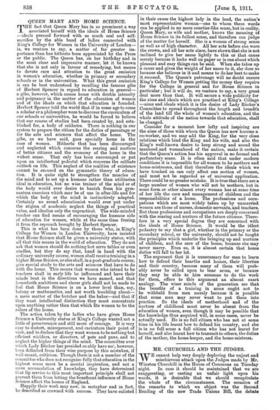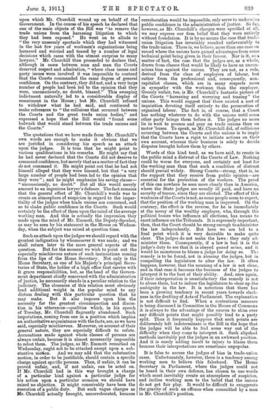Ma CHURCHILL AND THE JUDGES.
WE cannot help very deeply deploring the unjust and mischievous attack upon the Judges made by Mr. Winston Churchill in the House of Commons on Tuesday night. In case it should be maintained that we are exaggerating, or casting an unfair light upon his words, it is desirable that we should recapitulate the whole of the circumstances. The occasion of the remarks to which we object was the Second Reading of the new Trade Unions Bill, the debate upon which Mr. Churchill wound up on behalf of the Government. In the course of his speech he declared that one of the main objects of the Bill was "to remove the trade unions from the harassing litigation to which they had been exposed." He went on to allude to "the very unseemly spectacle which they had witnessed in the last few years of workmen's organizations being harassed and worried and teased by a number of legal decisions which came with the utmost surprise to many lawyers." Mr. Churchill then proceeded to declare that, although in cases between man and man the Courts deserved respect and admiration, "where class issues and party issues were involved it was impossible to contend that the Courts commanded the same degree of general confidence. On the contrary, they did not, and a very large number of people had been led to the opinion that they were, unconsciously, no doubt, biassed." This sweeping indictment naturally led to a considerable display of resentment in the House ; but Mr. Churchill refused to withdraw what he had said, and continued to make references to "the collisions that occurred between the Courts and the great trade union bodies," and expressed a hope that the Bill would "found some bulwark that would stand between the trade unions and the Courts."
The quotations that we have made from Mr. Churchill's own words are enough to make it obvious that we are justified in considering his speech as an attack upon the judges. It is true that he might point to various qualifications in his remarks. He might say that he had never declared that the Courts did not deserve to command confidence, but merely that as a matter of fact they do not command it. He might point out that he had not himself alleged that they were biassed, but that "a very large number of people had been led to the opinion that they were " ; and he might emphasize his saving clause- " unconsciously, no doubt." But all this would merely amount to an ingenious lawyer's'defence. The fact remains that the general effect of Mr. Churchill's words was to create an atmosphere of suspicion in regard to the impar- tiality of the judges when trade unions are concerned, and so to shake public confidence in the Courts. Such would certainly be the effect of them upon the mind of the average working man. And this is actually the impression they made upon the mind of Mr. Emmott, the Deputy-Speaker, as may be seen by his statement in the House on Wednes- day, when the subject was raised at question time.
Such an attack upon the judges we should regard with the greatest indignation by whomsoever it was made ; and we shall return later to the more general aspects of the question. But for the moment we wish to point out the especially mischievous nature of such insinuations coming from the lips of the Home Secretary. Not only is the Home Secretary, as one of his Majesty's principal Secre- taries of State, the holder of a high office that carries with it grave responsibilities, but, as the head of the Govern- ment department chiefly e,oncerned with the administration of justice, he necessarily stands in a, peculiar relation to the judiciary. The closeness of this relation must obviously lend additional weight in the popular mind to any dictum dealing with this particular question that he may make. But it also imposes upon him the necessity for the greatest circumspection and discre- tion in his utterances—qualities which, in his speech of Tuesday, Mr. Churchill flagrantly abandoned. Such imputations, coming from one in a position which implies an authoritative acquaintance with the facts, are, as we have said, especially mischievous. Moreover, on account of their general nature, they are especially difficult to refute. Accusations made against whole classes of persons are always unfair, because it is almost necessarily impossible to rebut them. The judges, as Mr. Emmott remarked on Wednesday, ought not to be attacked except upon a sub- stantive motion. And we may add that the substantive motion, in order to be justifiable, should contain a specific charge against specific persons. Then, if unfair, it can be proved unfair, and, if not unfair, can be acted on. If Mr. Churchill had in this way brought a charge of a particular kind against a particular judge for his action upon a particular occasion we should have raised no objection. It might conceivably have been the tixecution of a public duty. But such vague charges as Mr. Churchill actually brought, uncorroborated, because corroboration would be impossible, only serve to undermine public confidence in the administration of justice. So far, however, as Mr. Churchill's charges were specified at all, we may express our firm belief that they were entirely without foundation. It is by no means the case that trade- union litigation has invariably resulted unfavourably to the trade union. There is, we believe, more than one case on record where the unions have gained advantages from some technical point being given in their favour. Nor is it, as a matter of fact, the case that the judges are, as a whole, drawn from classes that would be likely to have an uncon- scious bias against the unions. They are not, as a rule, derived from the class of employers of labour, but rather from the professional and, consequently, non- capitalist classes, which are in many respects more in sympathy with the workman than the employer. Grossly unfair, too, is Mr. Churchill's fantastic picture of the Courts "harassing and worrying and teasing" the unions. This would suggest that there existed a sort of inquisition devoting itself entirely to the persecution of organized labour. The fact is, of course, that a Court has nothing whatever to do with the unions until some other party brings them before it. The judges no more lie in wait to pounce and prey on trade unions than on motor 'buses. To speak, as Mr. Churchill did, of collisions occurring between the Courts and the unions is to imply that the Courts have a right to initiate actions on their own account, whereas their business is solely to decide disputes brought before them by others.
Words of this kind tend, as we have said, to create in the public mind, a distrust of the Courts of Law. Nothing could be worse for everyone, and certainly not least for the working man than that such a condition of distrust should prevail widely. Strong Courts—strong, that is, in the support that they receive from public opinion—are essential for the protection of the workers. The proof of this can nowhere be seen more clearly than in America, where the State judges are usually ill paid, and have no security of tenure, since they are elected. The effect of this weakness of the Courts is not, as some people seem to expect, that the position of the working man is improved. On the contrary, the effect is the reverse, for he is immediately at the mercy of the wealthy employer, who, through the political bosses who influence all elections, has means to exert influence on the Tribunals. It is supremely important, then, that the Court should be strong enough to administer the law independently. But here we are led to a final point which it is very desirable to make quite clear. The judges do not make the laws : they only ad- minister them. Consequently, if a law is bad it is the judge's duty to see that it is obeyed quand mime, and it would be monstrous to blame a judge for doing so. Th3 remedy is to be found, not in abusing the judges, but in compelling the legislature to alter the law. It often happens, however, that the meaning of a law is not clear, and in that case it becomes the business of the judges to interpret it to the best of their ability. And, once again, if their interpretation is unsatisfactory the remedy is not to abuse them, but to induce the legislature to clear up the ambiguity in the law. It is notorious that there has been a growing tendency in recent years towards slack- ness in the drafting of Acts of Parliament. The explanation is not difficult to find. When a contentious measure is being discussed in Committee in the House of Commons it is always to the advantage of the caucus to skim over any difficult points that might possibly lead to a party split. Thus it frequently happens that such points are deliberately left indeterminate in the Bill in the hope that the judges will be able to find some way out of the difficulty when they come to interpret it. Such slipshod methods inevitably put the judges in an awkward position. And it is surely adding insult to injury to blame them because their interpretations are sometimes unpopular.
It is false to accuse the judges of bias in trade-union cases. Unfortunately, however, there is a tendency among working men to believe this falsehood. The Home Secretary in Parliament, where the judges could not be heard in their own defence, has chosen to use words which must inevitably create an atmosphere of suspicion, and incline working men to the belief that the unions do not get fair play. It would be difficult to exaggerate the gravity of such an offence when committed by a man in Mr. Churchill's position.







































 Previous page
Previous page